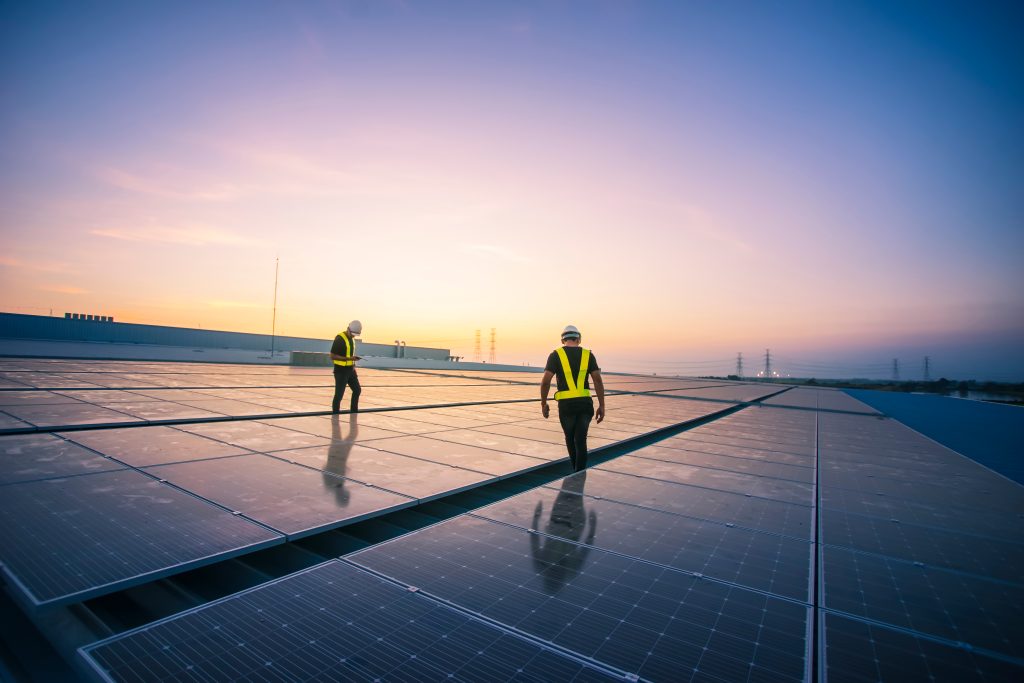As the world prioritizes sustainability, solar energy emerges as a key component of the renewable revolution. ACEN is spearheading this shift, strategically advancing solar energy development to meet global energy needs sustainably.
With a robust portfolio of innovative solar initiatives, ACEN is actively shaping the renewable industry. This reflects a mission to establish solar power as a cornerstone of energy strategies, rather than just an alternative. As a renewable energy solutions business, ACEN is committed to driving advancements that will pave the way for a cleaner, more sustainable future.
Solar energy development: Harnessing the sun’s power
The global move toward solar energy is driven by its environmental and economic benefits. Solar power produces zero greenhouse gas emissions during operation, helping reduce the carbon footprint and boost energy independence. As countries invest in solar infrastructure, it becomes a key element of sustainability efforts and creates jobs across different types of renewable energy sources.
Solar energy is harnessed by converting sunlight into electricity using photovoltaic (PV) cells. These cells absorb sunlight and generate an electric current, which is then converted into usable electricity for various uses. This technology has advanced significantly thanks to ongoing research and development, making solar a reliable and cost-effective energy source.
For ACEN, solar energy serves as an essential driver of renewable energy transition. By continuously advancing solar energy research and development, ACEN is contributing to a cleaner energy future and is positioning itself as a leader in global energy.

ACEN’s solar energy projects
ACEN’s leadership in renewable energy is demonstrated by its extensive portfolio of solar projects across the Philippines and beyond:
1. Pangasinan Solar
- Location: San Manuel, Pangasinan, Philippines
- Installed Capacity: 60 MW
- Homes Powered: ~20,300
The Pangasinan Solar project is a pivotal initiative for ACEN, marking the company’s first solar energy development in the region and one of its major projects in 2023. With a capacity of 60 MW, this ₱2.8 billion project is set to generate approximately 94 GWh of renewable energy annually, reducing CO2 emissions by about 58,369 metric tons each year.
Strategically located in Pangasinan, a province experiencing rapid development, the solar farm is directly connected to the grid via a 2km transmission line. This project addresses the growing energy demands but also supports local economic growth by creating around 1,000 jobs during construction.
The Pangasinan Solar Project exemplifies ACEN’s commitment to sustainable development and its ambitious goal of achieving 100% renewable energy by 2025. It also contributes to ACEN’s broader strategy of scaling up its renewable capacity, intending to reach 20 GW of attributable renewables by 2030.
2. Palauig Solar
- Location: Palauig, Zambales, Philippines
- Installed Capacity: 300 MW
- Homes Powered: over 200,000 homes*
The Palauig Solar project is one of ACEN’s largest solar developments in the Philippines. This project’s location in Zambales, a province with high solar irradiance, ensures optimal energy production. The scale of this project underscores ACEN’s capability to execute large-scale renewable energy projects that meet the growing energy needs of the country.
The project’s 63 MW first phase started delivering power to the grid in 2021. In 2023 ACEN announced a 300 MW phase 2 extension, setting a benchmark for solar energy production in the region. The expansion reflects ACEN’s strategic focus on scaling up successful projects to maximize impact. By leveraging the existing infrastructure and expertise, ACEN can efficiently increase the project’s capacity, making a substantial contribution to the Philippines’ renewable energy targets.
Through Palauig Solar, ACEN continues to bolster its renewable energy capabilities, contributing to the Philippines’ target of achieving a 35% renewable energy share in the power generation mix by 2030.
*includes projection based on the 300MW expansion
3. Arayat-Mexico Solar
- Location: Pampanga, Philippines
- Installed Capacity: 116 MW
- Homes Powered: ~19,000
The Arayat-Mexico Solar project, located in Pampanga, is a collaborative effort between ACEN and Citicore, showcasing a successful partnership in the renewable energy sector. This project is not only critical for meeting the growing energy demands in the rapidly developing region of Pampanga but also plays a significant role in the Luzon grid, especially during peak demand seasons.
The Arayat-Mexico Solar Farm underscores ACEN’s leadership in solar energy development and research, advancing not only sustainable power generation but also economic growth in the local community. The partnership exemplifies how collaborative efforts can lead to the successful execution of high-quality, timely projects that contribute to the broader goal of transitioning to renewable energy sources.
4. New England Solar
- Location: Uralla, New South Wales, Australia
- Installed Capacity: 521 MW (400 MWac)
- Homes Powered: ~300,000
The New England Solar project is one of ACEN’s most ambitious international projects, located in New South Wales, Australia. This project is a key component of New South Wales’ renewable energy roadmap, which aims to significantly increase the state’s renewable energy capacity by 2030. The New England Solar Farm’s substantial contribution to this goal underscores ACEN’s role as a leading player in the global energy transition.
New England Solar is one of the largest solar and battery storage projects in Australia, showcasing ACEN’s capability to deliver large-scale renewable energy initiatives through its subsidiary, ACEN Australia. The project supports Australia’s sustainability goals and strengthens ACEN’s position as a leader in solar energy development, reflected in its expanding portfolio of major renewable projects across the country.
5. Stubbo Solar
- Location: New South Wales, Australia
- Installed Capacity: 520 MW (400 MWac)
- Homes Powered: ~185,000
The Stubbo Solar project, located within the Central-West Orana Renewable Energy Zone in New South Wales, Australia, is a key project in ACEN’s expanding global renewable energy portfolio. The project includes a 200 MWh battery energy storage system, enabling it to store energy for use during peak hours and enhance grid stability.
Stubbo Solar Farm is part of ACEN’s broader strategy to establish a strong presence in Australia, a region with vast potential for solar energy research and development. The farm is strategically connected to the 330 kV network between Wollar and Wellington, ensuring efficient energy distribution to meet regional demands. This connection is crucial for delivering reliable, renewable energy to the grid, reinforcing ACEN’s commitment to maximizing the impact of its solar projects in Australia.
ACEN has partnered with PCL for the construction and aims to have the project operational by 2025. The project is also expected to create up to 400 jobs, prioritizing local employment to maximize community benefits.
The future of solar energy at ACEN

ACEN is committed to expanding its solar energy portfolio, with plans to incorporate cutting-edge technologies that will enhance efficiency and scale. The company is firmly on track to achieve 100% renewable energy by 2025, with an ambitious goal of reaching net-zero emissions by 2050.
The company’s leadership in Southeast Asia’s renewable sector, along with its focus on innovation and sustainability, positions it as a key player in the global energy transition, continuously pushing the boundaries of what’s possible in solar energy research and development.
Pioneering solar energy for a sustainable future
ACEN’s commitment to developing solar energy highlights its role as a leader in the renewable energy sector. By consistently innovating and expanding its solar projects, ACEN is driving significant progress toward a sustainable future.
Through these efforts, ACEN supports global sustainability goals and sets a benchmark for the renewable energy industry. The company’s focus on cutting-edge solar energy research ensures that it remains at the forefront of the transition to cleaner, more resilient communities.
References:
- Solar Energy Technologies Office. (2022). Solar Photovoltaic Cell Basics. Energy.gov. https://www.energy.gov/eere/solar/solar-photovoltaic-cell-basics
- U.S. Energy Information Administration. (2024, January 19). Solar energy and the environment. U.S. Energy Information Administration. https://www.eia.gov/energyexplained/solar/solar-energy-and-the-environment.php

